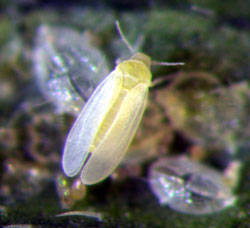 Southeastern growers continue to struggle with whiteflies and the diseases they leave behind in crops. Josh Freeman, assistant professor of horticulture at the University of Florida, said he is trying to advise growers to help them manage the pests and diseases as effectively as possible.
Southeastern growers continue to struggle with whiteflies and the diseases they leave behind in crops. Josh Freeman, assistant professor of horticulture at the University of Florida, said he is trying to advise growers to help them manage the pests and diseases as effectively as possible.
The large amount of adult whiteflies in crops had some very strong negative effects for growers this season. While adults were the main issue because of virus transmission and feeding, Freeman said the younger life stages were well-managed with insecticide usage by growers. He said that even if growers used chemistries proven to be highly effective to manage whiteflies, there would be 10,000 more whiteflies back in the field in a matter of days due to the short residual activity of the chemistries and large numbers of the pest in the environment.
According to Freeman, the whitefly population seems to be less now than it has been over the past two months. However, growers are still left with viruses causing harm to their crops. He estimates southeastern vegetable growers will see extensive losses — catastrophic, in some cases —in their crops because of the impact whiteflies had this season.
There is continued concern for a high whitefly population in the 2018 growing season. The spring season may be a strong indicator for whitefly populations during the fall. Freeman estimates that if there are still whiteflies appearing on scouting reports from growers in February and March, this could mean extreme numbers again for the fall season.
He said in order to try to combat this in the future, management strategies, including resistant varieties, are being examined to try to help growers create the best possible strategies for a successful growing season.
Share this Post









